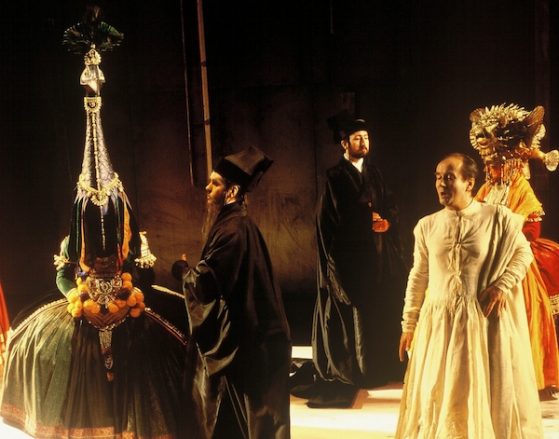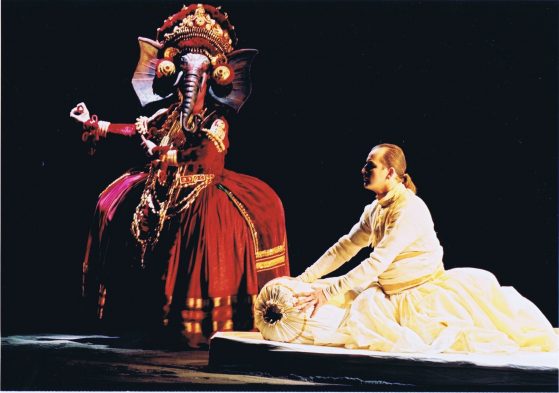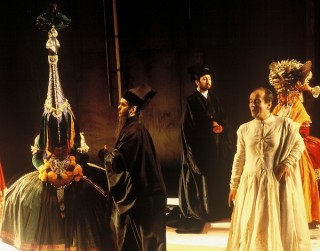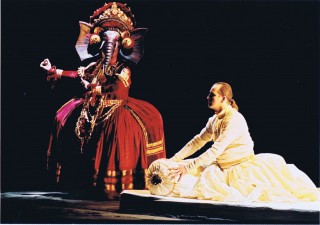Broken Strings
Opera in One Act
YEAR: 1992
YEAR OF REVISION: 1995
ORCHESTRATION: 1(pic,afl)1(ca)1(e flat cl)1+cbn/211(T/B)/2perc/cel.hp.gtr/str[1.1.1.1.1]
DURATION: 60'
LANGUAGE: English
LIBRETTO BY: DAVID RUDKIN, after a traditional Buddhist tale Guttil Jatak
COMMISSIONED BY: Landeshauptstadt Muenchen for the Muenchener Biennale 1992
DEDICATION: Oliver Knussen
AVAILABILITY: Novello & Co. London
PREMIERE DATE: May 11, 1992
PREMIERE INFORMATION:
by the Netherlands Opera, Amsterdam
(De Nederlandse Opera)
with the Asko Ensemble conducted by David Porcelijn,
11 – 14 May 1992 (Amsterdam) and 22 – 24 May (Munich)
Stage Direction by Pierre Audi
Design by Chloe Obolensky
Lighting by Jean Kalman
Dramaturgy by Klaus Bertisch
Composed April 1991 to March 1992
(Revised October/November 1995 and 1997)
WORK NOTES:
CD of BBC Studio Recording of Almeida Opera / London Sinfonietta production (1996) released November 2024. Buy CD here.
The Libretto is based on an ancient Buddhist tale from the Pali Canon Guttil Jatak. This work, written at the request of Hans Werner Henze, is the second part of the Double Bill which includes its companion work Snatched by the Gods.
“The companion piece, Broken Strings, is musically more individual and instrumentally even more lustrous: hearing it played so superbly by the ASKO Ensemble under David Porcelijn was like turning the pages of a richly illuminated Persian or Moghul book.” – Paul Griffiths, The Financial Times, 18 May 1992
“[Broken Strings’] sound-world is utterly individual [and]…moves at its own dangerously leisurely pace. Well, so do Bruckner and Birtwistle, and the way the audience was held in breathless silence at the climax…suggests Vir knows perfectly well what he is doing.” – Rodney Milnes, Opera, 01/02/1998
PRODUCTION HISTORY
1. NETHERLANDS OPERA for the Munich Biennale, Amsterdam and Munich, 1992, dir. Pierre Audi
2. ALMEIDA OPERA London, 1996, dir. David Farnes
3. SCOTTISH OPERA Glasgow and Edinburgh, 1998, dir. Antony MacDonald
4. MUSIKVERKSTAAT 1999
5. STAAT OPER BERLIN 1999
6. TRANSPARAANT OPERA Antwerp, Rouen, Rotterdam 2001: Revival of Original Production (Netherlands Opera), dir. Pierre Audi
The post of Player to the King is vacant. Musicians throughout the Kingdom have been summoned and heard; and all found wanting. But at last the young Musil is called forward, and it would seem the search must be over. Brilliant, versatile, Musil is secure in one simple conviction: he has heard, in all the contest, no talent to equal his; he will surely be chosen. To his surprise the Judges reject him; and a mysterious old man appears – Guttil, almost blind; stammering, out of practice, fumbling on his instrument: a beggar, he seems, but with a strange authority, and compelling respect. Barely waiting for the command, he begins to play.
Yet hardly has the old man begun, when one of his strings breaks. Distressed, and faltering at first, he yet plays on; and from his instrument an extraordinary new note begins to sound. Then a second string breaks; then a third . . More and more intensely, the old man plays on, with less and less. His music becomes even more extraordinary, and magical creatures begin to appear, delighting in this miraculous music. Even the three Judges will begin to see and wonder. Only the young Musil is unaffected. Impressed but unmoved, he can only interpret the old man’s magic as some external trick effect, that can be taught and imitated. To achieve the same magic, he breaks his own strings; but now no music comes from them at all. He has destroyed his own instrument.
This strange story, originally an ancient Buddhist legend, is here adapted and framed operatically as a “play within a play”, performed by court actors for their own King. It is a play that he has never seen before: and as one by one the old musician’s strings break, the Spectator King becomes increasingly disturbed, and interrupts the actors; tries to stop the play . .
(Synopsis by David Rudkin)
The Scotsman (19 February 1998)
Reviewer: Mary Miller
There is both ravishing music and supreme wit. Three gorgeous creatures weave from Vir’s enchanting score – an elephant as lush and gracious as a rajah, a fish the stuff of fantasy (oh, to have a diamante dolphin as a headpiece) and a peacock (with iridescent dreadlocks). And the singing, to have this threesome breathe miracles, is superb, from Susan Gorton and Ann Archibald, although Alexander Anderson-Hall’s bird seemed strained. Guttil (Richard Lloyd Morgan) is moving, Musil (Stephen Rooke) elegantly miffed. The jury trio is also excellent.




